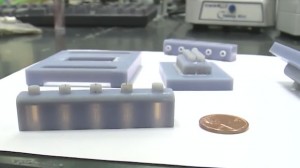NEW YORK (Reuters Health) – When used to prevent postpartum hemorrhage (PPH) following cesarean section, a single dose of carbetocin (Duratocin, Pabal) is less likely than oxytocin (Sintocinon) to require additional oxytocic treatment, British investigators report.
But while carbetocin may be a more potent oxytocic, “it is unclear whether this will reduce the rate of PPH and in particular major PPH,” the authors write.
Carbetocin is a synthetic analog of oxytocin with prolonged pharmacological effects. Though previous research has shown it may be more effective following c-section, this is the first study to directly compare carbetocin with the currently recommended dose of oxytocin (5 IU). A report appeared online May 19th in BJOG: An International Journal of Obstetrics and Gynaecology.
Dr. George Attilakos, from Southmead Hospital in Bristol, UK, and colleagues studied 377 women with singleton pregnancies at term undergoing elective or emergency cesarean section under regional anesthesia. They excluded patients with placenta previa and placental abruption.
In their double-blinded study, the authors randomized the patients to receive either carbetocin 100 mcg (n = 188) or oxytocin 5 IU intravenously after delivery (n = 189).
Significantly more women needed additional oxytocics (usually 40 IU of oxytocin infused over 4 hours) in the oxytocin group (45.5% vs. 33.5%, relative risk 0.74, p = 0.023), regardless of the presence of hemorrhage risk factors. The most common indication was for treatment of postpartum hemorrhage.
There were no significant differences in the estimated blood loss, uterine tone at the end of the operation, number of women with major postpartum hemorrhage, or number requiring blood transfusions. And overall, the adverse event profiles “appear reassuringly similar between the two medications,” the authors said.
One woman in the carbetocin arm had a massive hemorrhage. She lost an estimated 9000 mL and received 14 units of red blood cells. Along with the study drug she also received two doses of ergometrine, misoprostol, carboprost, and infusion of oxytocin 40 IU. Ultimately her uterine arteries were ligated.
The researchers point out that while carbetocin costs more than oxytocin (GBP £17.64 vs. £0.86, or USD$25.58 vs. $1.25), it may be less costly than having to administer prolonged oxytocin infusions.
Concluding, they write, “If carbetocin is shown to have a similar hemodynamic profile to oxytocin, it may become the medication of choice for women with hypertensive disorders or cardiac problems.”
Carbetocin is approved for use in Canada and the UK, but not in the US. Ferring UK, the maker of carbetocin, provided support for the study and two of its authors.
Reference:
http://www.ncbi.nlm.nih.gov/pubmed/20482535.
BJOG 2010.




